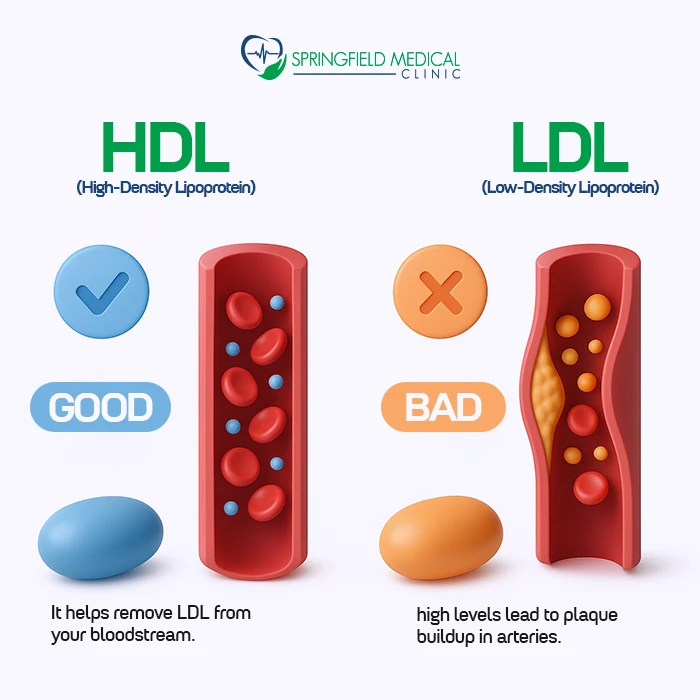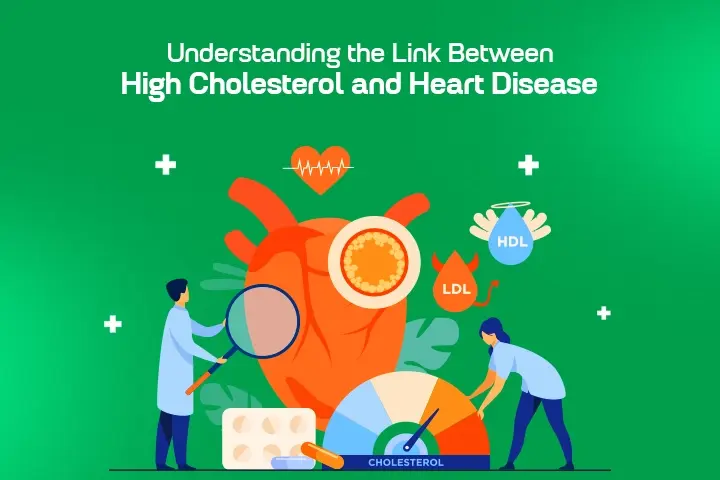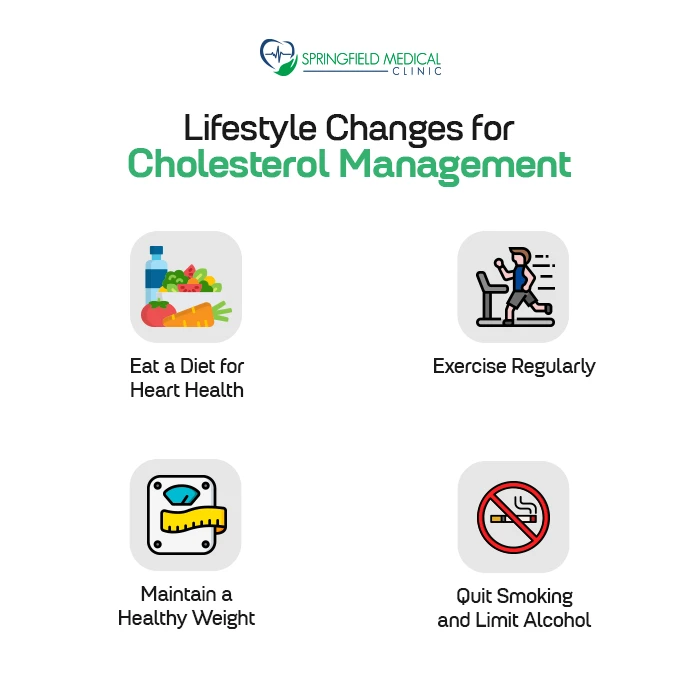Published on:19-05-2025
High cholesterol is one of the most significant yet manageable risk factors for heart disease. As millions of people face cardiovascular complications each year, understanding how high cholesterol and heart disease are connected is essential for prevention and treatment.
What Is Cholesterol?
Cholesterol is a waxy substance found in your blood, necessary for building cells and hormones. However, when levels become unbalanced—especially with too much low-density lipoprotein (LDL)—it can become dangerous.
LDL vs HDL Cholesterol
- LDL (Low-Density Lipoprotein): Known as “bad” cholesterol, high levels lead to plaque buildup in arteries.
- HDL (High-Density Lipoprotein): Known as “good” cholesterol, it helps remove LDL from your bloodstream.
A proper balance between LDL and HDL is crucial for maintaining cardiovascular health.

How High Cholesterol Causes Heart Disease
The connection between high cholesterol and heart disease lies in the formation of plaque—a fatty substance that narrows the arteries. This buildup, called atherosclerosis, reduces blood flow to the heart, potentially leading to coronary artery disease (CAD) and heart attacks.
Over time, a blocked artery can rupture or form a clot, causing a heart attack or stroke. This silent process often begins without symptoms, making routine screenings essential.
The Cholesterol and Blood Pressure Connection
High cholesterol and high blood pressure often go hand in hand. As cholesterol builds up in arteries, it makes them narrower and less flexible. This forces the heart to pump harder, raising blood pressure. Over time, this cholesterol and blood pressure connection increases the risk of heart failure, stroke, and other serious conditions.
Causes of Heart Disease Related to Cholesterol
Several causes of heart disease are directly influenced by elevated cholesterol levels, including:
- Genetic predisposition (e.g., familial hypercholesterolemia)
- Unhealthy diet rich in saturated fats, trans fats, and processed foods
- Lack of exercise and sedentary lifestyle
- Smoking and alcohol abuse
- Obesity and metabolic disorders
Understanding these triggers helps in crafting a personalized prevention plan.
Recognizing Heart Attack Risk Factors
Many individuals are unaware they have high cholesterol until it’s too late. Be alert to common heart attack risk factors, including:
- Family history of heart disease
- Smoking or excessive alcohol use
- Physical inactivity
- Overweight or obesity
- Poor dietary habits
- Chronic stress
If you have one or more of these risk factors, consider regular cholesterol testing and cardiac checkups.
Lifestyle Changes for Cholesterol Management
Making sustainable lifestyle changes for cholesterol can drastically improve your heart health and reduce the risk of complications. Here's what you can do:
1. Eat a Diet for Heart Health
- Adopt a diet for heart health by choosing foods that naturally lower cholesterol.
- Increase: Leafy greens, berries, whole grains, legumes, fatty fish (like salmon), and olive oil.
- Avoid: Red meat, full-fat dairy, deep-fried items, and baked goods with trans fats.
- Tip: Add fiber-rich foods like oats and flaxseeds to your diet for additional heart-healthy benefits.
2. Exercise Regularly
At least 150 minutes of moderate aerobic activity weekly can help:
- Raise HDL
- Lower LDL and triglycerides
- Improve circulation and weight control
3. Maintain a Healthy Weight
Losing just 5–10% of your body weight can significantly improve cholesterol levels and overall heart health.
4. Quit Smoking and Limit Alcohol
Smoking lowers HDL and accelerates plaque buildup, while excessive alcohol raises triglycerides and blood pressure. Eliminating or reducing these habits contributes to better cardiovascular outcomes.
Natural Alternatives to Support Healthy Cholesterol Levels
While medication may be prescribed in some clinical settings, many individuals can achieve healthy cholesterol levels through natural interventions. In addition to diet and exercise, the following strategies have shown promise:
- Increase plant sterols and stanols: Found in fortified foods like certain spreads and orange juice, these compounds help block cholesterol absorption.
- Consider heart-friendly supplements: Options like psyllium husk, garlic extract, and omega-3 fatty acids from fish oil may support LDL reduction.
- Manage stress: Chronic stress may influence lipid levels and blood pressure. Techniques such as yoga, meditation, and mindfulness can improve cardiovascular outcomes.
- Sleep well: Getting at least 7–8 hours of restful sleep each night supports metabolic processes, including lipid regulation.
As always, consult with a healthcare provider before starting any new dietary supplement or regimen.
When to Seek Medical Advice
If you're over 20, schedule a cholesterol test every 4 to 6 years—or more often if you have risk factors. At Springfield Medical Clinic, we offer full lipid panel testing, personalized care plans, and lifestyle coaching to help you manage high cholesterol and heart disease proactively.
Conclusion
Understanding the connection between high cholesterol and heart disease is a crucial step in preventing life-altering cardiovascular events. Whether you're managing LDL vs HDL cholesterol, monitoring the cholesterol and blood pressure connection, or implementing lifestyle changes for cholesterol, each step you take contributes to a healthier heart and a longer life.
Take control of your heart health—book a cholesterol screening at Springfield Medical Clinic today.
FAQs
Q1: How often should I check my cholesterol?
Adults should check their cholesterol every 4–6 years, or more frequently if they have other heart attack risk factors or a family history of heart disease.
Q2: Can I reverse high cholesterol through diet and exercise?
Yes, adopting a diet for heart health and regular exercise can significantly improve cholesterol levels.
Q3: What are healthy cholesterol numbers?
- LDL: Under 100 mg/dL
- HDL: 60 mg/dL or higher
- Total cholesterol: Under 200 mg/dL
Q4: How are high cholesterol and blood pressure related?
High cholesterol can cause narrowed arteries, which increases blood pressure. Managing both conditions reduces your risk of heart disease and stroke.
Q5: What foods should I avoid if I have high cholesterol?
Limit red meats, fried foods, processed snacks, and full-fat dairy. Focus instead on whole foods, vegetables, and sources of healthy fats.
Q6: Can young adults have high cholesterol?
Yes. Poor lifestyle choices and genetics can lead to high cholesterol at a young age. Early detection is key to long-term prevention.
Q7: What is the difference between LDL and HDL cholesterol?
LDL vs HDL cholesterol: LDL builds plaque in arteries (bad), while HDL helps clear it out (good). You want low LDL and high HDL.
Q8: Will exercise alone lower my cholesterol?
Exercise boosts HDL and helps lower LDL, but for best results, combine physical activity with dietary changes.
Q9: Are there symptoms of high cholesterol?
High cholesterol typically has no symptoms. It’s often detected through blood tests, making regular screenings essential for early intervention.
Q10: Can stress affect cholesterol levels?
Yes. Chronic stress can influence hormone levels and inflammation, potentially impacting your cholesterol and heart health. Managing stress is vital for prevention.


